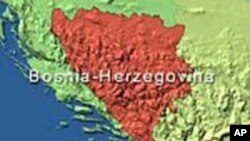<!-- IMAGE -->
An international body known as the Peace Implementation Council is meeting November 18-19 in Sarajevo to discuss Bosnia-Herzegovina's political future.
The council was created in December 1995, shortly after the signing of the Dayton Peace Accords that ended the ethnic war in Bosnia-Herzegovina. The conflict lasted almost four years. An estimated 100,000 people were killed and two million were displaced.
The Peace Implementation Council is made up of 55 countries and international organizations - such as the International Monetary Fund and the Red Cross. Its main purpose is to oversee the implementation of the Dayton Peace Accords.
Those agreements established a loosely-federated government divided between a Muslim-Croat Federation and a Serb Republic - the Republika Srpska. There is also a central government made up of a three-member presidency in which Bosnian-Serb, Bosnian-Croat and Bosnian-Muslim members are represented. But experts agree the national-level Bosnian government is weak.
Srecko Latal is an analyst with the International Crisis Group in Sarajevo, the Bosnian capital. He says the Bosnian system of government is cumbersome and ineffective. As a result, he says, Bosnia is going through the most difficult political crisis since the end of the war in 1995.
"And the reason for that is essentially because the three ruling national parties, as well as other parties that make up the ruling coalition, have increasingly been engaged in radical rhetoric before, during and after the general elections in 2006. And the situation has continued escalating ever since 2006 until nowadays. And as a result of this escalation of political tensions, most of the ruling parties as well as the leaders insist on their maximalist demands, which makes compromise extremely difficult," Latal said.
Experts say real political power is wielded by the Office of the High Representative - a body set up by the Dayton Peace Accords. The High Representative - currently Austrian diplomat Valentin Inzko - is named by the Peace Implementation Council.
Latal says at the beginning, the Office of the High Representative was set up only to monitor and supervise the implementation of the Dayton Peace Accords.
"In 1997 it received broad governing powers, in essence to basically speed up peace implementation and to end deadlocks and political blockades that were imposed at that time by nationalist leaders immediately after the war. Over time, the role of the Office of the High Representative changed and it became engaged more and more into deeper and deeper reforms in the country, such as the reform of the police force as well as the reform of the defense system. Unfortunately, over the past few years, the Office of the High Representative has been essentially abandoned by the international community or it has lost much of its support that it previously had," Latal said.
He and others say many countries, including Serbia and Russia, want to eliminate the post of the Office of the High Representative.
"Many European countries also want to see the Office of the High Representative closed and most of them want this for a very simple reason, which is they believe that it is time for [the] people of Bosnia-Herzegovina and leaders of Bosnia-Herzegovina to take responsibility for the fate of their country into their own hands. And they all say that the existence of such a body such as the Office of the High Representative, with broad governing powers, is simply not in line with countries [vying] for European Union membership," Latal said.
Observers say during its Sarajevo meeting, the Peace Implementation Council will discuss whether or not to close down the Office of the High Representative.
An expert on Bosnia at London's Kingston University, Marko Hoare, says eliminating the office is a bad idea.
"There are strong tendencies within the European Union to appease Belgrade and to appease Russia, so they have those reasons for wanting to close it down. But in actual fact, it would have the effect of facilitating the partition of Bosnia and the further disintegration of the state," Hoare said.
Many experts - including Latal and Hoare - say it is too early for the international community to abandon Bosnia-Herzegovina. They say the Peace Implementation Council must either increase the power of the Office of the High Representative or find another way to make the international presence felt in the country.




